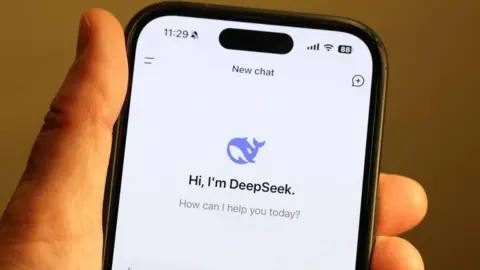In a significant development within the realm of artificial intelligence, South Korea has imposed a ban on the downloading of DeepSeek, a prominent AI chatbot developed in China. This action follows increasing concerns regarding the app’s compliance with data protection laws and its impact on national security. The South Korean Personal Information Protection Commission has been at the forefront of this decision, emphasizing that DeepSeek will not be available for new downloads until it rectifies several compliance issues.
DeepSeek surged in popularity shortly after its release, gaining immediate traction among South Korean users, evidenced by its rapid ascent to the top of various app stores and accumulating over a million weekly users within a week of launch. However, with its swift rise came increased scrutiny not only from South Korean authorities but also from various international jurisdictions grappling with potential privacy risks and overarching national security implications. The quick adaptation and acceptance of DeepSeek in South Korea highlighted a critical moment for AI technologies, magnifying the necessity for regulatory frameworks that can adequately address emerging digital threats.
On a practical level, the personal data protection agency announced that the chatbot would become unavailable across major application distribution platforms, namely Apple’s App Store and Google Play, reflecting the agency’s commitment to safeguarding user information. This ban was further amplified when South Korean government agencies directed their employees to refrain from downloading the app onto their work devices, indicating the perceived risks associated with its usage. Choi Sang-mok, South Korea’s acting president, described the situation surrounding DeepSeek as a “shock,” indicating that its implications could transcend the sphere of artificial intelligence and potentially affect various sectors of the economy.
Despite the ban on downloading DeepSeek, users who had previously installed it would still retain access to the app and could utilize it through its dedicated website. This provision ensures that existing users are not cut off entirely, allowing them to continue using a tool they may have come to depend on. Nevertheless, the government’s stance reflects a growing inclination toward the regulation of AI technologies, emphasizing the importance of data protection and privacy considerations in an increasingly digital world.
The controversy doesn’t stop in South Korea; DeepSeek’s rapid acceptance has raised alarms globally, prompting other countries like Taiwan and Australia to prevent the application from being utilized on government-operated devices. Italy, which previously imposed a ban on ChatGPT due to privacy concerns, has similarly taken action against DeepSeek, demanding alterations to its privacy policies before any reinstatement is considered.
The United States has also entered the fray, with lawmakers proposing legislation to restrict DeepSeek’s access on federal devices, citing surveillance threats. Likewise, state-level initiatives in Texas, Virginia, and New York are echoing a similar narrative of caution regarding AI usage in government environments. The substantial capabilities of DeepSeek’s language model, which purportedly delivers reasoning functionalities on par with established US AI systems, have raised further questions about the competitive landscape of artificial intelligence. Concerns abound around the substantial funding channeled into AI advancements in the US, particularly when a competing product claims to offer similar performance levels at a significantly reduced cost.
Overall, the unfolding situation around DeepSeek encapsulates a critical intersection of technology, privacy, and governance in the modern era. The swift actions by South Korea and other nations underline the pressing need for robust regulatory frameworks capable of navigating the complexities of AI developments, ensuring that emerging technologies are aligned with national interests and protective of user data privacy. This ongoing discourse will undoubtedly influence future policy-making regarding AI in South Korea and beyond, as the world grapples with the implications of rapidly evolving digital technologies.



